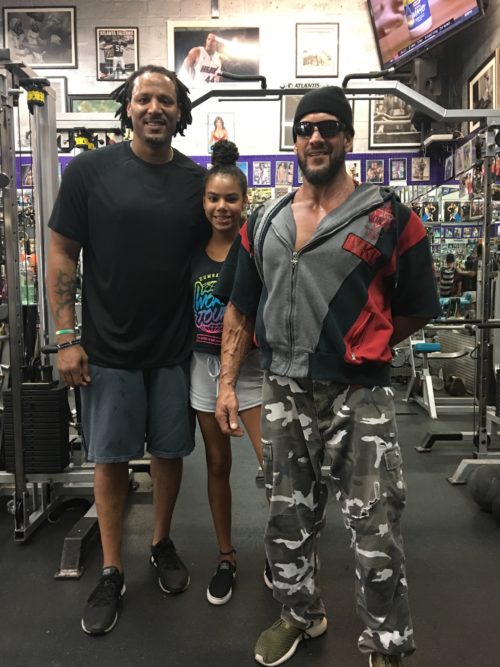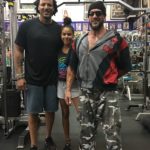I was excited for the continuation of my career. There are lots of great tales from my twelve years in the NBA—uplifting and entertaining stories about teamwork, and how quality of life takes sweat and determination. I also discuss the importance of exercise and nutrition for Parkinson’s patients, like me, through the Brian Grant Foundation.
As companies and organizations requested my speaking services, you would think I’d be happy and grateful. Right? No! There were days when I wanted to barricade my front door. There was one thing holding me back from wanting to expose myself, and it wasn’t easy to admit—I was ashamed of the weight I had gained. Some speakers worry about audience response. I worried about the buttons of my suit jacket popping off and hitting someone in the eye. Humor became my coping mechanism. I named my growing belly the “Love Keg” and hoped no one would notice my discomfort.

Every email, meeting, or phone call seemed like a chore, rather than opportunity. The dark, winter skies in Portland seemed to go on forever, and all I wanted was to lounge on the couch with a bag of salt and vinegar chips. When spring finally arrived, I knew it was time to get help. A side-effect of Parkinson’s is that it drains the brain of the feel-good chemical, dopamine. Because of that, I needed an ongoing plan to boost my energy and spirit, and take charge of this situation.
While in Miami for my foundation’s gala, I had to face my old friends in a less-than-healthy condition. Strangers were polite, but my buddies knew that I was off my game. My former trainer was there, Dodd Romero. With only one look from Dodd, I realized how out of balance I had become physically, mentally, and spiritually. A few weeks later, I was on a plane back to Florida to jumpstart my health under Dodd’s supervision. When he picked me up at the airport, we went straight to the gym to face what needed to be done.
At first, it was rough, but by the third day, we were doing exercises that Dodd didn’t think I’d be able to do for weeks. My muscle memory came back quickly and surprised the hell out me. Dodd figured out how to safely move my whole body, even with a shoulder injury. I’m done with basketball, but I’m happy to say, “I can still bust out reps in the weight room!”
There was no soda or alcohol at Dodd’s, so my “water weight” came off easily. The “real weight” soon followed—around 22 pounds, which makes looking at myself way more tolerable! While eating nutrient-rich foods, another thing surprised me. My taste buds came alive. Dodd’s wife would bring me a treat with a tiny bit of peanut butter, and it would taste like heaven! We’d gorge on freshly caught fish, and I learned how to cook with ingredients like cauliflower rice.
Dodd isn’t a go-to-church-type of Christian, but you would be blown away at the miracles that have happened in his life. God is at the center of everything for him. Famous people want to train with him, yet he waits to get the go from God. His discernment is one of the things I like most about him.
Being with Dodd showed me that I wasn’t accessing my higher power. When things would go well, I’d take all the credit. When things went badly, I’d then include God, but only to blame him. Dodd reminded me that God has a plan for each of us, if we’re willing to pray and be led.
Each day with Dodd trained my body, sharpened my mind, and fed my spirit. We did exercises that I thought were impossible for a retired athlete and Parkinson’s patient. It was almost like being back at a Coach Pat Riley practice. The exhaustion that would follow was humbling.
While in Florida, I got to see Coach Riley. He gave me a copy of a best-selling book called, “The Four Agreements.” One agreement says, “Don’t make assumptions.” It sounds like common sense, but this one lesson has changed my thinking. All my life, I’ve made assumptions about what other people were thinking, how they should act, and even how they should behave on the roads. Let me tell you, Miami is one of the worst places to drive. It was almost impossible to quiet down my judgements and assumptions.
It didn’t happen overnight, but I slowly began to change for the better. My thoughts became less angry, my body felt more toned, and I had a new appreciation for the people in my life and work.
To remember the summer of 2017, I wrote down my own Four Agreements. When the sun is no longer shining and it’s dark at 4 p.m., these guidelines won’t allow me to sabotage what’s important.
1. Know when to ask for help.
2. Let your body surprise you.
3. Consider God’s plan.
4. Just keep trying.
I want to give my family, friends, and future audiences the best version of me possible because anything less is just too painful. Maybe that’s why public speaking terrifies people. You can’t escape how you feel inside, and you can’t ignore it when all eyes are on you.
My coaches used to say, “You can’t always control the ball, but you can control your effort.” Our time here on Earth is precious, and so are the bodies we’ve been given. I’m not going to let Parkinson’s or depression dampen what I came here to do, or what we can do together.
What’s your winter plan to feel your best? Now is the time to self-reflect and seize the opportunities ahead.
